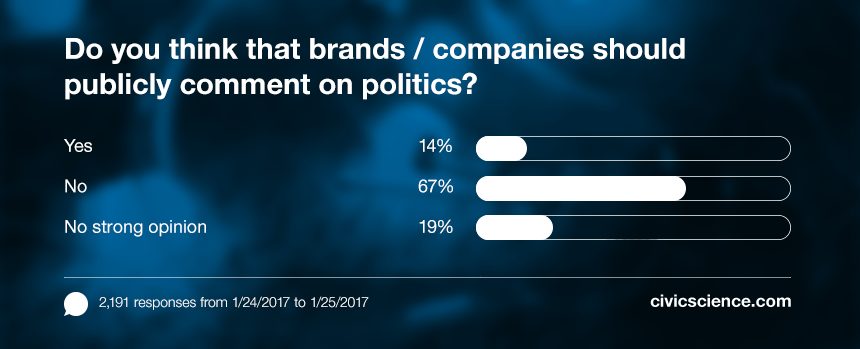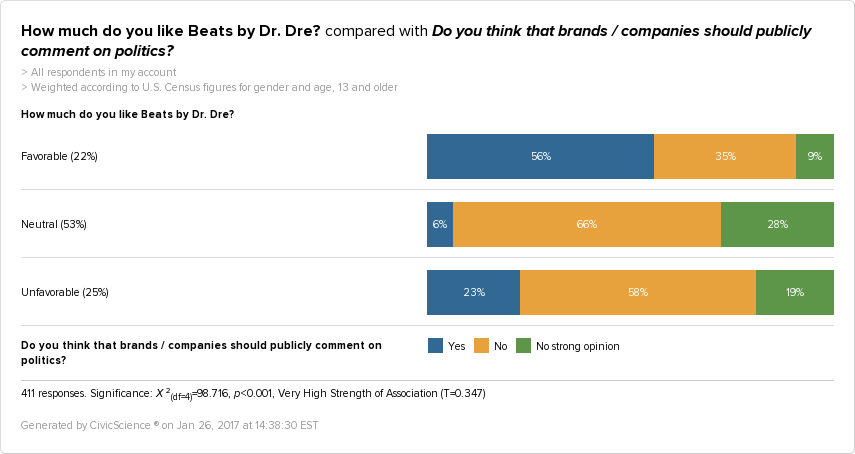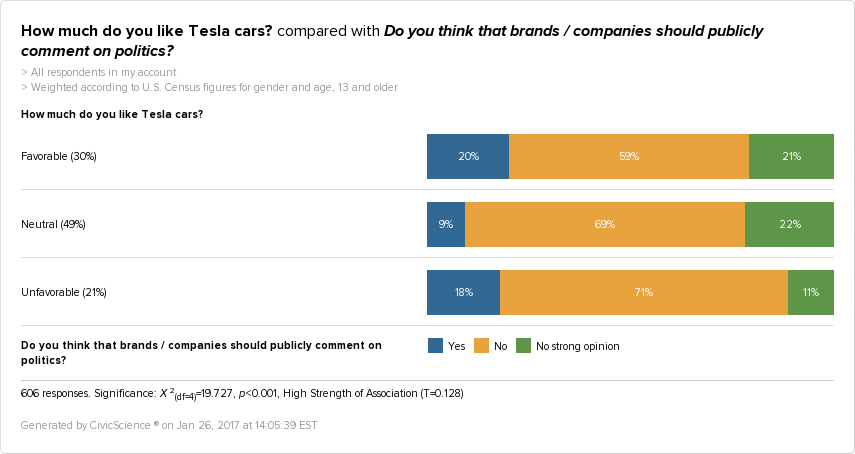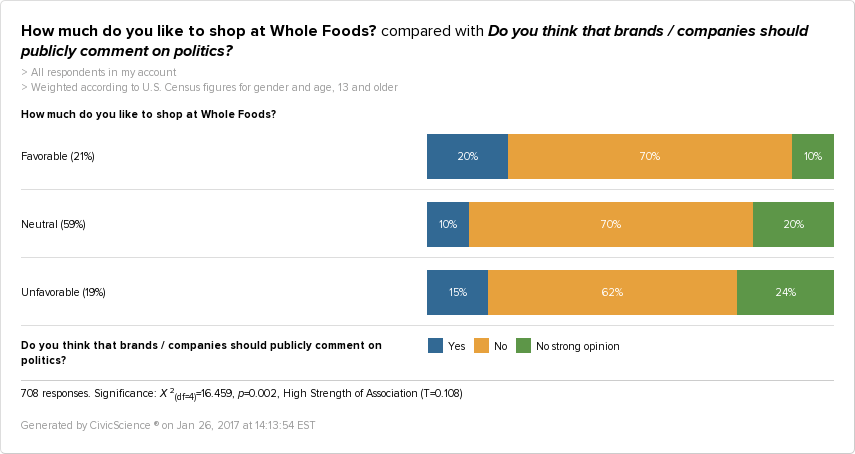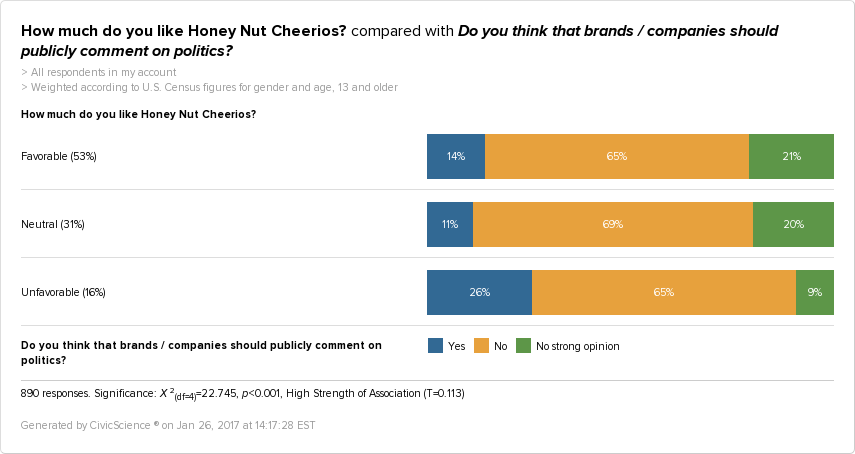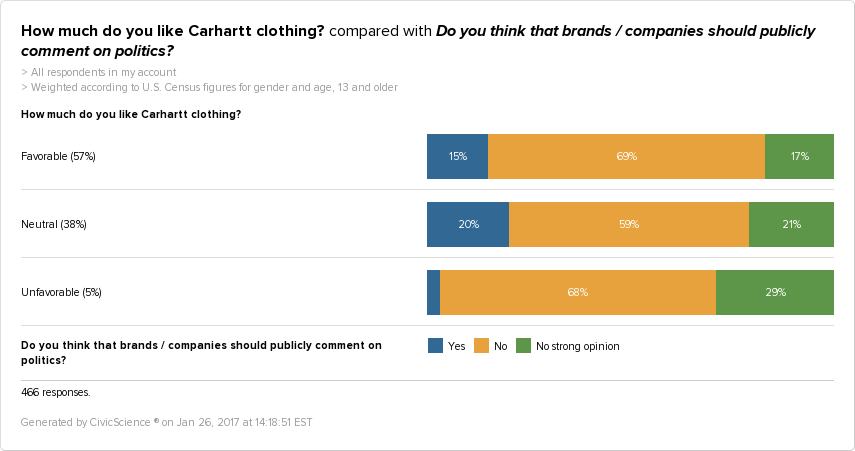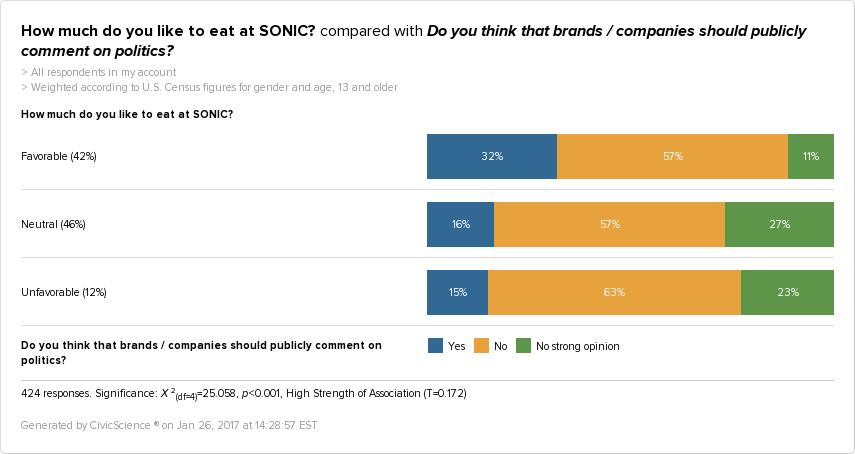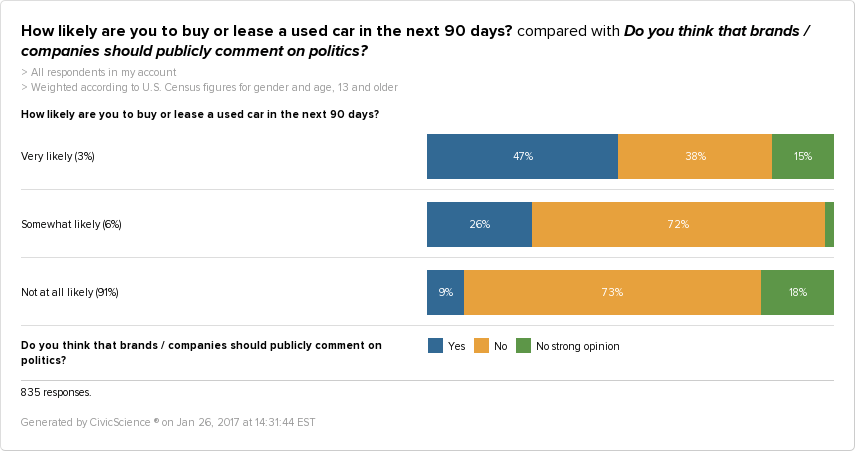As more companies publicly comment on the current political landscape, there has been growing criticism of these brand tactics, with scattered praise as well. According to our data, companies like Kellogg’s have actually stood to benefit from their political commentary, while others have not faced the same fate. In addition, our past research has shown that CEO activism, as it’s come to be called, can actually benefit major companies.
When we asked our respondents what they think of the modern day company/politics dilemma, here’s what we found:
Right off the bat, we see that the majority of Americans do not think that brands and companies should publicly comment on politics. To stay on the safe side, brands might want to keep their political opinions to themselves.
However, among the 14% who do think that brands should publicly comment on politics, we discovered some interesting insights. Although many brands will want to stay away from politics, that’s not the case for all of them.
Now, we won’t tell these brands exactly what they should say based on the varying political affiliations of their fans – although we could. We have to keep some air of mystery, after all!
Before delving into the brands, here is one general piece of advice for everyone: young brands should speak out. We found that people under 18 years old are 84% more likely to say that brands/companies should publicly comment on politics. In addition, Millennials are 25% more likely to answer the same, while Baby Boomers are 20% more likely to answer the opposite.
And next, out of the 250+ brands that we evaluated, here is what we found:
1. Biggest Correlation First – Beats by Dr. Dre. Fans of this celebrity-saturated headphone brand are 161% more likely than others to believe that companies/brands should publicly comment on politics. To put this into perspective, the number of Beats fans who hold this position outnumber the national average, according to our data, by 4x.
Given that many of this brand’s celebrity endorsers have spoken out politically, it may not be too far-fetched for the company to begin speaking up louder as well.
2. Tesla. No surprises here, but fans of Tesla are 49% more likely than others to think that brands/companies should publicly comment on politics. In addition, there are an almost equal number who think the same among Tesla’s non-fans. Though many of these folks still believe that brands/companies shouldn’t involve themselves in politics, this does present opportunities for the tech-savvy car brand.
3. Whole Foods. This is also not a huge shocker, given our past insights into the Whole foods fan. Fans of this health giant are 48% more likely than others to believe that companies/brands should publicly comment on politics. In fact, 1 out of every 5 Whole Foods fans hold this view.
4. Honey Nut Cheerios. This one is interesting. In opposition to fans of the other listed brands, people who are not fans of Honey Nut Cheerios are 70% more likely to believe that brands/companies should publicly comment on politics. If this cereal brand is hoping to win over potential customers, this may provide a useful place to start.
5. Carhartt Clothing. Here, we see that both fans of Carharrt clothing, and those who feel neutral towards the brand, are more likely to think that brands/companies should publicly comment on politics. However, this rugged outdoor wear brand will probably want to cater to a different political demographic than Whole Foods, or even Tesla. Speaking up on political issues may be a good idea for this company to keep current fans, and convert those who currently don’t feel strongly about it.
6. SONIC. Fans of SONIC may also be open to some political commentary. In fact, SONIC fans are 42% more likely to believe that companies/brands should comment on politics. Take a look:
7. Cars. It may come as a surprise that car brands may not want to be so quick to shy away from politics. Take a look at this:
47% of those who say they are “Very likely” to buy or lease a car in the next 90 days believe that brands / companies should publicly comment on politics. That number is 26% among those who are “Somewhat likely” to buy or lease a car in the next 90 days.
So, for car companies that are hoping to bring in these potential buyers, one way to differentiate themselves may be to play around with political messaging. Of course, that messaging will need to vary from brand to brand, due to the different demographics and political affiliations of different car buyers. But generally speaking, these potential buyers might be swayed by a politically active car brand.
Also, given all of the manufacturing drama that’s rampant within the automotive industry, this may present further opportunities. It may be inevitable that car companies will have to speak out about policy changes that affect them, and when they do speak out, they may bring in potential buyers.
And lastly…
8. UGG. Given the data about age, it comes as no surprise that people who say they love UGG footwear and apparel are 240% more likely to say that they think brands/companies should publicly comment on politics. The young brand may face a great deal of praise from their activist fans if it decides to use its platform in a political way.
So, there you have it.
Although, the majority (67%) of Americans do not think that brands/companies should publicly comment on politics, there are definitely still brands that could benefit from speaking out for causes that their fans, and potential fans, care about.
Want to see how your brand stacks up? Let us know!
Check back on our blog for more insights daily, like the 5 Traits of Marshalls Fans!
